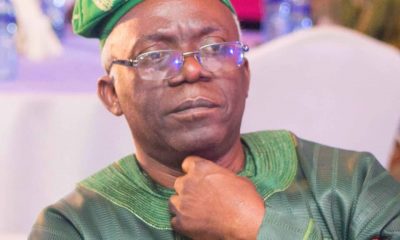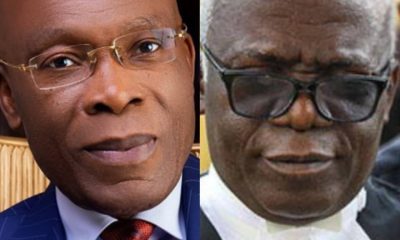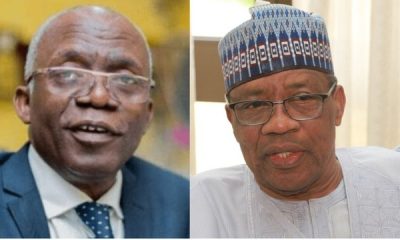Business
Zinox demands apology from Femi Falana SAN over alleged defamation, reputational damage
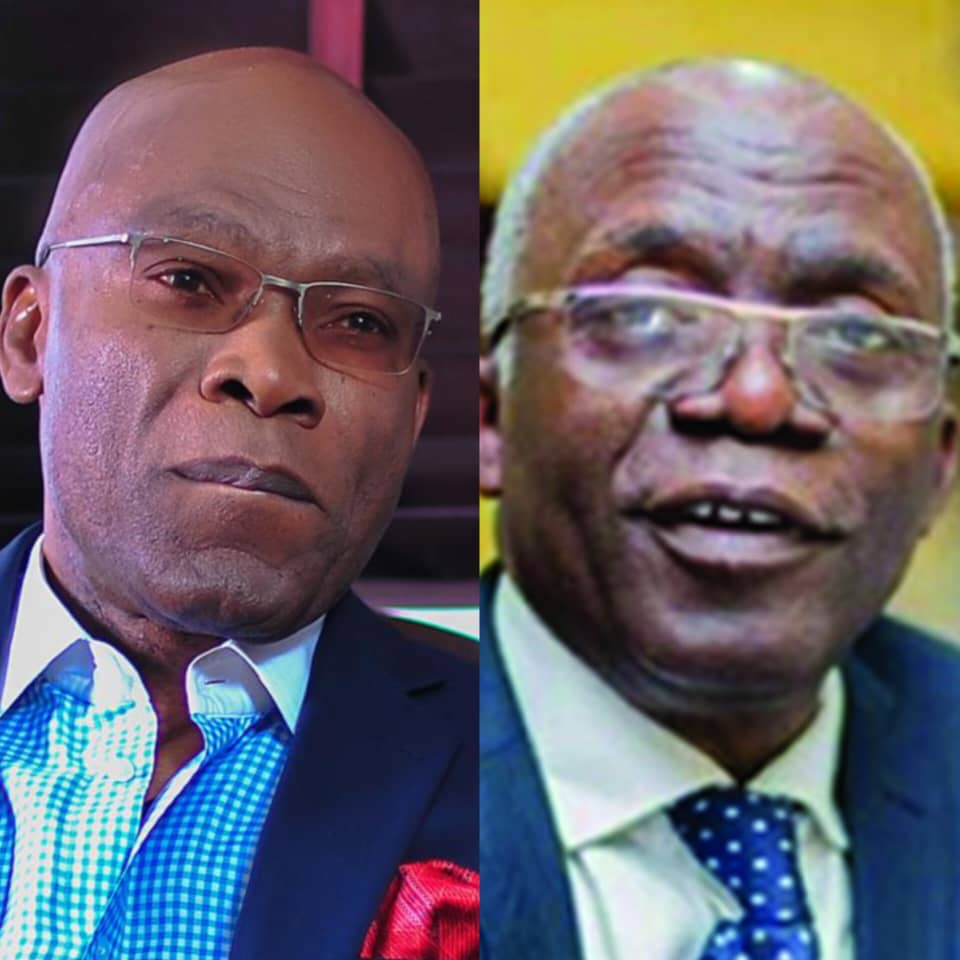
Zinox demands apology from Femi Falana SAN over alleged defamation, reputational damage
The management of foremost African digital conglomerate, Zinox Technologies Limited, has demanded public apology from Mr. Femi Falana SAN, over alleged defamation and reputational injury inflicted on the company and its representatives by Falana and his client, Benjamin Joseph, the CEO of Citadel Oracle Concept Limited, an Ibadan-based computer firm.
In a statement on Sunday, Zinox referenced recent news items in the media relating to certain charges filed by Falana, purporting to act on a fiat donated to him by the Attorney General and Minister of Justice of the Federal Republic of Nigeria, Mr. Lateef Fagbemi SAN, whom Zinox said may not have been properly briefed.

“We are sure that if the circumstances of this case were made available to the respected Honorable Attorney General, Lateef Fagbemi SAN, he would not have granted the purported fiat to Femi Falana,” Zinox said in the statement.
In the news reports, Falana was said to have filed a suit before Honorable Justice A. O. Ebong of the FCT High Court in charge no. FCT/HC/CR/985/24 in November 2024, a suit Zinox said was based on the same claims which various courts had in the past dismissed as falsehood and baseless.
“Our initial reaction was to ignore these publications as the usual campaigns of calumny that have been orchestrated against Zinox since 2014 by one Mr. Benjamin Joseph, the Managing Director of Citadel Oracle Concept Ltd, the client of Mr. Femi Falana SAN. However, we are persuaded to respond by the consideration that once falsehood is sustained over time, it tends to acquire the garb of truth.”
Zinox said the case arose from a contract between Citadel and Technology Distributions Limited over the supply of computers to the Federal Inland Revenue Service (FIRS), stressing that the matter has no bearing whatsoever with Zinox and its promoter, Mr Leo Stan Ekeh.
“Firstly, we are shocked that Femi Falana would include Zinox in his purported fiat/charges, a company that has nothing to do with the transaction or allegations. For the records, we want to state as follows:
“Zinox has never been invited by any investigative agency, including the police and the EFCC, on these allegations. There is no report either by the police or the EFCC or any investigative agency where the name of Zinox was mentioned as a suspect. There is no judgment or ruling of any court where Zinox was mentioned as having anything to do, whatsoever, with the transaction or the allegations, the basis of the fiat/charges. Mr. Leo Stan Ekeh, the Chairman of Zinox, has never made any statement to the police in the course of any investigations and has never been mentioned in any court proceedings or judgment as part of any investigations relating to these allegations. Indeed, he has never met with Benjamin Joseph before,” the statement said.
Zinox cited instances in which Mr. Joseph lost the case and its adjunct suit. In a petition/case Mr. Joseph reported since 2013 and for which the Inspector General of Police charged him for false information in charge no.CR/216/16, he was unable to prove his allegations for more than 8years .
In another case filed by the EFCC at his instance against his partner, Princess Kama, in charge no. FCT/HC/CR/244/2018, Honorable Justice Danlami Z. Senchi of the FCT High Court (as he then was), dismissed as false all the allegations made by Benjamin Joseph, and imposed the sum of N20 million as damages against him for false petitioning in relation to these same allegations.
Zinox alleged that the current charges said to have been filed by Falana on the basis of a fiat from the Attorney General is the third in a row as he had earlier filed charge no.CR/469/2022, which was struck out by Honorable Justice C. O. Oba of the FCT High Court, by an order dated 8th November 2022.
In what appears to be forum shopping and abuse of court process, “he filed the same charges before Honorable Justice A. S. Adepoju of the FCT High Court, which charges were, once more, struck out by the Honorable Court on 19th March 2024, with Honorable Justice Adepoju holding that: “This matter was brought in dead, extinct and should be confined into the dustbin of history…I hold that the instant suit is an abuse of the process of court and it is hereby struck out accordingly,” the statement said.
Zinox said it was shocked that a “learned Senior Advocate in the person of Femi Falana, would, yet, proceed to file the same charges before Honorable Justice A. O. Ebong of the FCT High Court in charge no. FCT/HC/CR/985/24 in November 2024.”
The statement said: “It is, therefore, very clear that the deliberate intention for instituting this new charge by Femi Falana SAN, to include the name of Zinox and its Chairman and other persons who were never part of the investigations, is to embarrass them, harm their reputation, and thereby damage their businesses. In the circumstance, we hereby demand a public apology from Mr. Femi Falana SAN, if he is unable to produce the evidence demanded above.
“We, therefore, assure all our business partners, stakeholders, and friends, that we are not ruffled by these spurious allegations. While our lawyers are set to defend the present charges purportedly filed by Femi Falana SAN, we shall not fail to explore all legal remedies against persons associated with the orchestration of these false allegations and publications against us,” Zinox said.
Bank
Alpha Morgan to Host 19th Economic Review Webinar

Alpha Morgan to Host 19th Economic Review Webinar
In an economy shaped by constant shifts, the edge often belongs to those with the right information.
On Wednesday, February 25, 2026, Alpha Morgan Bank will host the 19th edition of its Economic Review Webinar, a high-level thought leadership session designed to equip businesses, investors, and individuals with timely financial and economic insight.
The session, which will hold live on Zoom at 10:00am WAT and will feature economist Bismarck Rewane, who will examine the key signals influencing Nigeria’s economic direction in 2026, including policy trends, market movements, and global developments shaping the local landscape.
With a consistent track record of delivering clarity in uncertain times, the Alpha Morgan Economic Review continues to provide practical context for decision-making in a dynamic environment.
Registration for the 19th Alpha Morgan Economic Review is free and can be completed via https://bit.ly/registeramerseries19
It is a bi-monthly platform that is open to the public and is held virtually.
Visit www.alphamorganbank to know more.
Business
GTBank Launches Quick Airtime Loan at 2.95%

GTBank Launches Quick Airtime Loan at 2.95%
Guaranty Trust Bank Ltd (GTBank), the flagship banking franchise of GTCO Plc, Africa’s leading financial services group, today announced the launch of Quick Airtime Loan, an innovative digital solution that gives customers instant access to airtime when they run out of call credit and have limited funds in their bank accounts, ensuring customers can stay connected when it matters most.
In today’s always-on world, running out of airtime is more than a minor inconvenience. It can mean missed opportunities, disrupted plans, and lost connections, often at the very moment when funds are tight, and options are limited. Quick Airtime Loan was created to solve this problem, offering customers instant access to airtime on credit, directly from their bank. With Quick Airtime Loan, eligible GTBank customers can access from ₦100 and up to ₦10,000 by dialing *737*90#. Available across all major mobile networks in Nigeria, the service will soon expand to include data loans, further strengthening its proposition as a reliable on-demand platform.
For years, the airtime credit market has been dominated by Telcos, where charges for this service are at 15%. GTBank is now changing the narrative by offering a customer-centric, bank-led digital alternative priced at 2.95%. Built on transparency, convenience and affordability, Quick Airtime Loan has the potential to broaden access to airtime, deliver meaningful cost savings for millions of Nigerians, and redefine how financial services show up in everyday life, not just in banking moments.
Commenting on the product launch, Miriam Olusanya, Managing Director of Guaranty Trust Bank Ltd, said: “Quick Airtime Loan reflects GTBank’s continued focus on delivering digital solutions that are relevant, accessible, and built around real customer needs. The solution underscores the power of a connected financial ecosystem, combining GTBank’s digital reach and lending expertise with the capabilities of HabariPay to deliver a smooth, end-to-end experience. By leveraging unique strengths across the Group, we are able to accelerate innovation, strengthen execution, and deliver a more integrated customer experience across all our service channels.”
Importantly, Quick Airtime Loan highlights GTCO’s evolution as a fully diversified financial services group. Leveraging HabariPay’s Squad, the solution reinforces the Group’s ecosystem proposition by bringing together banking, payment technology, and digital channels to deliver intuitive, one-stop experiences for customers.
With this new product launch, Guaranty Trust Bank is extending its legacy of pioneering digital-first solutions that have redefined customer access to financial services across the industry, building on the proven strength of its widely adopted QuickCredit offering and the convenience of the Bank’s iconic *737# USSD Banking platform.
About Guaranty Trust Bank
Guaranty Trust Bank (GTBank) is the flagship banking franchise of GTCO Plc, a leading financial services group with a strong presence across Africa and the United Kingdom. The Bank is widely recognized for its leadership in digital banking, customer experience, and innovative financial solutions that deliver value to individuals, businesses, and communities.
About HabariPay
HabariPay is the payments fintech subsidiary of GTCO Plc, focused on enabling fast, secure, and accessible digital payments for individuals and businesses. By integrating payments and digital technology, HabariPay supports innovative services that make everyday financial interactions simpler and more seamless.
Enquiries:
GTCO
Group Corporate Communication
[email protected]
+234-1-2715227
www.gtcoplc.com
Business
BUA Group, AD Ports Group and MAIR Group Launch Strategic Plan for World-Class Sugar and Agro-Logistics Hub at Khalifa Port
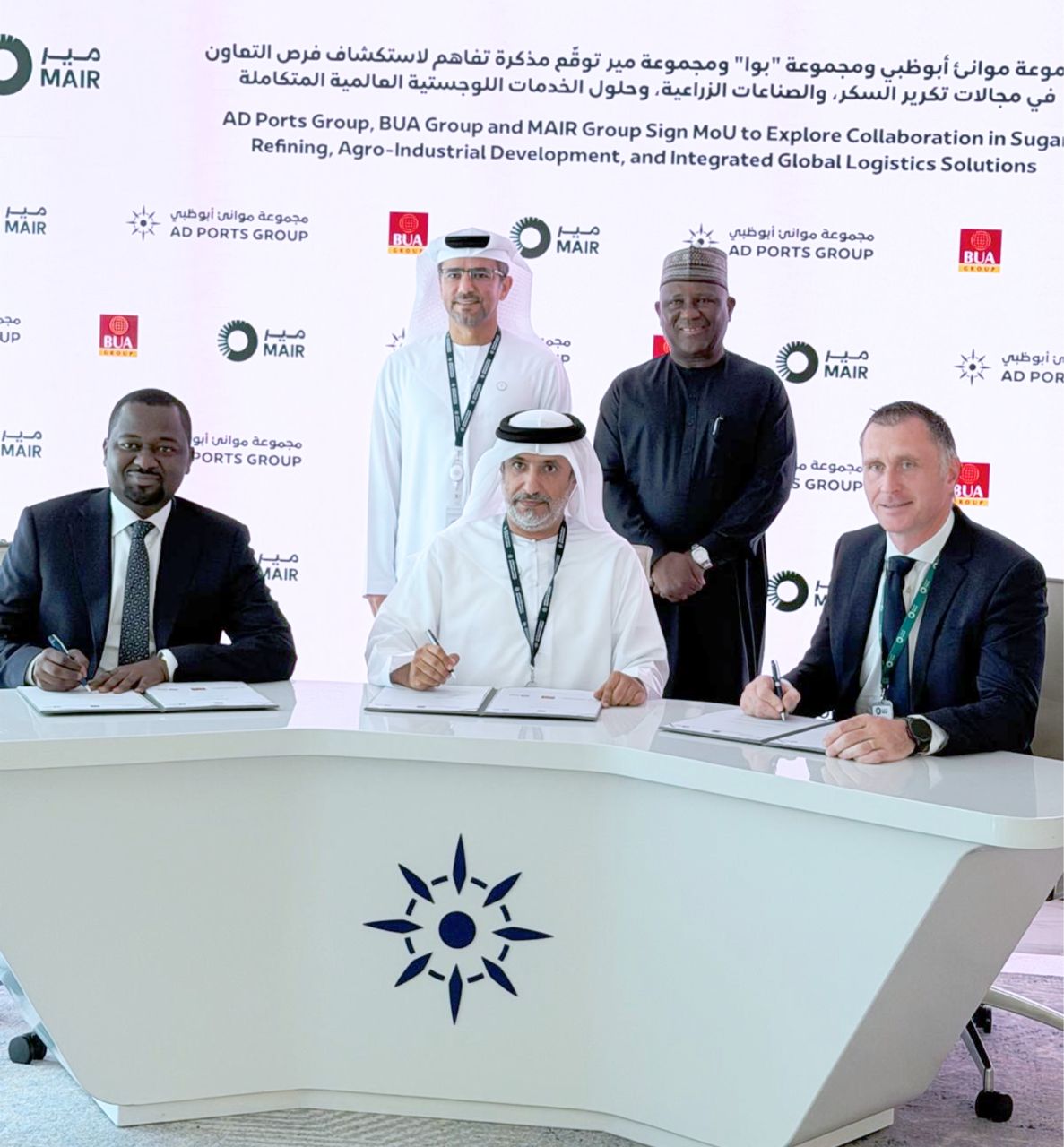
BUA Group, AD Ports Group and MAIR Group Sign MoU to Explore Collaboration in Sugar Refining, Agro-Industrial Development, and Integrated Global Logistics Solutions
Abu Dhabi, UAE – Monday, 16th February 2026
BUA Group, AD Ports Group, and MAIR Group of Abu Dhabi today signed a strategic Memorandum of Understanding (MoU) to explore collaboration in sugar refining, agro-industrial development, and integrated global logistics solutions. The partnership aims to create a world-class platform that strengthens regional food security, supports industrial diversification, and reinforces Abu Dhabi’s position as a hub for trade and manufacturing.
The proposed collaboration will leverage BUA Group’s industrial and logistics expertise, Khalifa Port’s world-class infrastructure, and AD Ports Group’s operational experience. The initiative aligns with the objectives of the UAE Food Security Strategy 2051, which seeks to position the UAE as a global leader in sustainable food production and resilient supply chains. It also aligns with Nigeria’s food production- and export-oriented agricultural transformation agenda, focused on scaling domestic capacity, strengthening value addition, improving post-harvest logistics, and unlocking new markets for Nigerian produce across the Middle East, Asia, and beyond.

Photo Caption: L-R: Kabiru Rabiu, Group Executive Director, BUA Group; Cpt. Mohammed J. Al Shamisi, MD/Group CEO, AD Ports Group; Saif Al Mazrouei, CEO (Ports Cluster) AD Ports Group; Abdul Samad Rabiu, Founder/Executive Chairman, BUA Group; and Steve Green, Group CFO, MAIR Group
Through structured aggregation, processing, storage, and maritime export channels, the partnership is designed to reduce supply chain inefficiencies, enhance traceability and quality standards, and also create a predictable trade corridor between West Africa and the Gulf.
BUA Group—recognised as one of Africa’s largest and most diversified conglomerates, with major investments across sugar refining, food production, flour milling, cement manufacturing, and infrastructure- brings extensive industrial expertise and large-scale operational capability to the venture. MAIR Group will provide strategic support in developing integrated logistics and agro-industrial solutions, creating a seamless platform for production, storage, and distribution.
Abdul Samad Rabiu, Founder and Chairman of BUA Group, said:
“This MoU marks an important milestone in BUA’s international expansion and reflects our long-term vision of building globally competitive industrial platforms. Together with AD Ports Group and MAIR Group, we aim to develop sustainable food production and logistics solutions that strengthen regional supply chains and support the UAE’s Food Security Strategy 2051.”
He further added that, “This partnership represents not just a commercial arrangement but a strategic food corridor anchored on shared economic ambition, resilient infrastructure, and disciplined execution, reinforcing long-term food security objectives for both nations.”
A representative of MAIR Group added:
“This collaboration underscores our commitment to advancing strategic industries in Abu Dhabi and building integrated solutions that reinforce the UAE’s position as a global hub for trade, food security, and industrial excellence.”
A spokesperson from AD Ports Group commented:
“Our partnership with BUA Group and MAIR Group highlights Khalifa Port’s role as a catalyst for high-impact industrial investments. This initiative will enhance regional food security, strengthen global trade connectivity, and support Abu Dhabi’s economic diversification goals.”
This MoU marks a historic collaboration that combines world-class infrastructure, industrial expertise, and strategic vision, setting the stage for a sustainable and resilient food and logistics ecosystem that will benefit the UAE, the region, and global markets alike.
-

 celebrity radar - gossips6 months ago
celebrity radar - gossips6 months agoWhy Babangida’s Hilltop Home Became Nigeria’s Political “Mecca”
-

 society6 months ago
society6 months agoPower is a Loan, Not a Possession: The Sacred Duty of Planting People
-

 society5 months ago
society5 months agoReligion: Africa’s Oldest Weapon of Enslavement and the Forgotten Truth
-

 news6 months ago
news6 months agoTHE APPOINTMENT OF WASIU AYINDE BY THE FEDERAL GOVERNMENT AS AN AMBASSADOR SOUNDS EMBARRASSING


